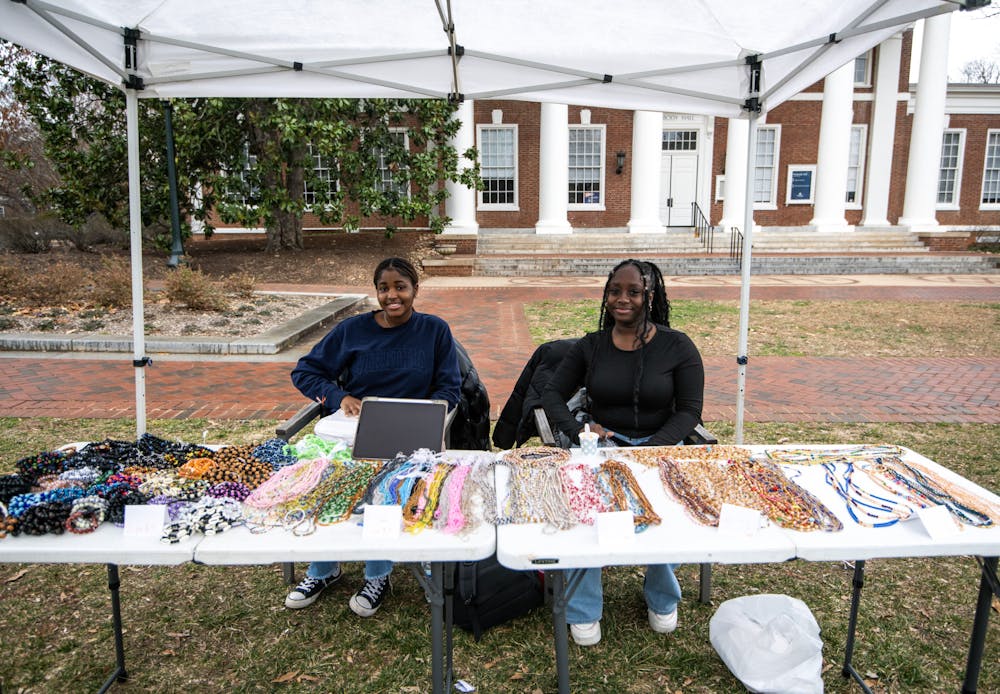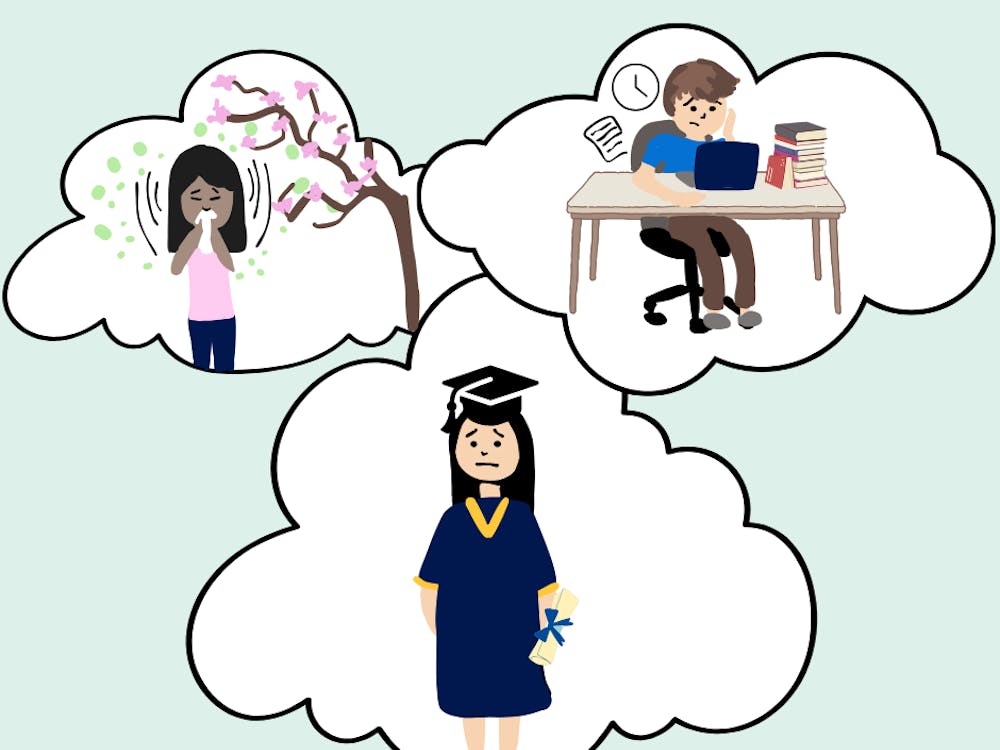Nine Black-owned Charlottesville and student-run businesses arrived on Peabody Lawn Saturday for the Black Economic Empowerment Society’s inaugural pop-up shop event. Despite cloudy weather, there was an air of excitement as vendors set up their tents and shared their products with visitors. As BEES’ first event involving local businesses, the pop-up shop demonstrated crucial progress in connecting the Black communities of the University and Charlottesville as a whole.
Open to everyone, the event offered local Black-owned businesses a chance to share their products with University students and expand their customer base. The spread of vendors included clothing retailers, food businesses and body care brands. The event also featured a DJ and a raffle with prizes such as a flatscreen TV and AirPods.
Founded in January 2023, BEES aims to support the economic empowerment of Black students by enabling them to open businesses and reach their personal finance goals. The CIO hosted two Black Student Business Expos in 2023 to support student-run entrepreneurship, where participants earned a total of $818 and gained 114 followers on their business social media accounts. Saturday's event marked a new effort to expand BEES’ impact to the greater Charlottesville area.
Syrell Grier, CEO of BEES and third-year College student, explained that when Black students were first admitted to the University, they relied on the Black Charlottesville community for support. However, according to Grier, the growing size of the Black student body has caused a disconnect between the two communities, leading Black students to turn to each other for support more often than to Black Charlottesville residents.
“Over the years, as more and more Black students start to come here, it's like they isolate themselves from the community and become more introspective,” Grier said.
For Grier, events like the pop-up shop help connect Black University students with surrounding support systems, encouraging them to become less isolated.
“I've learned a lot from being involved in the Black Charlottesville community because there's a lot of history there,” Grier said. “There's a lot of great people out there — whether it's a business owner or nonprofit owner — a lot of Black people out there trying to help the community and I feel like a lot of Black U.Va. doesn't get that sort of exposure.”
The University — like many other Virginia institutions — has a history of displacing local communities of color in the interest of campus expansion. One of the most prominent examples of this displacement is the 1960s razing of Vinegar Hill, when the City of Charlottesville wiped out a center of Black business for urban development. The razing coincided with a large increase in the University’s student population and physical campus, but the growth had forced over 600 Black families out of their homes and shut down 30 Black-owned businesses. For local residents today, the memory of Vinegar Hill and the risk of gentrification remains salient.
For Grier, the responsibility of correcting this displacement lies on the shoulders of the University. He noted that many local businesses miss out on marketing opportunities due to lack of exposure to University students. With almost 17,000 undergraduate students and over 23,000 total students, the University is a major market for local businesses. According to Grier, the University must act on its commitment to be a “good neighbor” by supporting local businesses.
“I think U.Va. does need to rectify the ills that it has inflicted on the Charlottesville community, and one way of doing that is helping business owners [and] helping Charlottesville community residents tap into the economic powerhouse that is U.Va.,” Grier said.
Throughout the afternoon, the pop-up shop attracted a diverse group of students who came to browse the shops, listen to music and learn more about local Black-owned businesses. Some attendees said that they had discovered the pop-up shop through social media, while others were drawn in by the music during their study breaks. Second-year College student Samia Naar said that she was inspired to come to the event to support Black Charlottesville businesses.
“I've gotten introduced to a lot of businesses that are either here on Grounds or in Charlottesville,” Naar said. “There’s a lot of good things out here, like clothing and some cool pieces to get, so it was definitely worth coming out.”
Second-year Engineering student Kennedy Gordon also emphasized the importance of supporting Black owned businesses.
“I don’t have a lot of opportunities to go to Black-owned businesses — I don’t know the area super well — so I always like to take the opportunity to support them when I can,” Gordon said.
Beza Bisrat, owner of the culinary business Ethiopian Delights and Darden student, showcased authentic Ethiopian cuisine at the event. She said that Charlottesville’s limited Ethiopian cuisine drove her to create a business honoring her Ethiopian roots.
“Cooking Ethiopian food helped me feel more connection to my culture and to my family,” Bisrat said. “I wanted to provide that opportunity for people as well, especially if they didn't know how to cook it.”
Rum Punch Jamaican Restaurant was also among the nine businesses. Owned by Raquel and Marvin White, a husband and wife team, Rum Punch provides authentic Jamaican food inspired by Raquel’s background as a Jamaican woman. Excited by the opportunity to share her culture with students, Raquel White expressed her appreciation for BEES’ mission of supporting young Black people.
“I wanted to represent this Jamaican food as authentic,” White said. “I am originally from Jamaica, I was not born here. I'm Jamaican and so all the food is authentic — rice and peas, oxtails, jerk chicken — everything is authentic from my country. I just want to show the community what it's about.”
Student attendees left the event not only with new clothes and jewelry but also with a newfound awareness of diverse Black businesses in Charlottesville. Both vendors and BEES executive members expressed their hope for a future with more events like this one that aim to connect the University community with the Black Charlottesville community.
“I hope BEES keeps doing events like this because I think being able to bring the community together [and] elevating the work of Black businesses like this is phenomenal,” Bisrat said.







